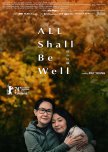Deze recentie kan spoilers bevatten
with in-laws like these, who needs enemies?
This quietly brutal film depicts a violence of memory/remembering - a violence of erasure, of withholding, of rewriting history and truth - enacted against queer people by their family members once those queer people are silenced by factors beyond their control. It unflinchingly shows how family members betray the two lesbian women in their lives after the death of the one who is their biological relative. They do this by ignoring her wishes, by betraying her grieving widow (their in-law), by insulting the widow's dignity, by undermining the widow's belonging in the family, and by betraying any sense of proper relations among kin - all in order to take the wealth left behind by their deceased relative. The film helps us to understand the motivations for each character's choices against a history of class differences and the oppressive backdrop of Hong Kong's material scarcity for basic needs. We are shown how a lack of institutional and societal recognition of queer relationships creates the opportunity for shameful behavior between family: in a deeply unequal society organized around capitalism (alluded to throughout the film, but most explicitly in the mention of how the deceased woman had managed to rise from being a factory worker to a factory owner; and also looming in the background of the housing crisis hanging over everyone in the film), these extended family members see no way to pursue a decent life other than by turning against their queer kin.
The disgracefulness of this so-called "family" is shown in how they apologetically disrespect the two queer women who had previously helped them financially (at least to some limited extent), specifically by kicking the surviving partner out of the apartment she had shared with her deceased partner. They justify this choice as a way to give her nephew his own exclusive place to raise a new baby. Heterofuturity (here as a privileging of the heterosexual continuity of future generations against queer people still alive in the present) manifests in the way that the extended family assumes that the only reasonable way they can benefit from their deceased kin's estate is by asserting their exclusive control over her apartment; they aren't even able to imagine or propose any compromises in which they might share the apartment with their lesbian in-law by living in the apartment together and taking care of each other. In this way, they foreclose any possibility of keeping this queer family member in their lives, much less any possibility of growing closer to her after the loss of this person who had been such an important presence in all of their lives. If (to quote a remark made by the queer couple when they shared a particularly expensive whiskey with their extended family in the film's prologue) "sharing with family isn't wasting", then the extended family lays waste to their kinship relations with their lesbian in-law, by taking the apartment from her and then refusing to share it with her.
Ultimately the film ends with a bitter sense of exasperated acceptance, and perhaps of resignation: with no options available under the legal system for staying in her apartment, the widow has capitulated to the demands of her deceased partner's extended family. She makes this decision after getting written confirmation of the truth of her partner's intentions (which had been to leave everything to her) after even that was questioned by one of her in-laws. The widow's lesbian friends (which is her and her former partner's found family in multiple ways) step in as replacements in order to carry out the familial rites and responsibilities to her deceased partner, responsibilities which had been so coldly abandoned by her deceased partner's biological kin: I am especially talking about the burial-at-sea of flower petals as a symbolic way of fulfilling the deceased's wishes which had been overruled by the extended family. We end with a scene remembering how much meaning the deceased woman had found in her queer family as an adult, after a childhood of hollow and sometimes even violent biological kinship. This scene bookends all the ways the film has shown us the biological/extended family using their traditional values to rationalize their understandable - yet utterly shameful - behavior, underscoring the film's critique of heterosexist ways of doing "family".
This film evoked a complicated mix of emotions in me. Through much of the film I felt anger at the unjust way the family treated their grieving lesbian in-law. And in the ending scene it transformed into a heavy sadness, in my recognition of an aspect of my own difficult experiences with family with the ending scene's reflection on finding meaning in the concept of "family".
The disgracefulness of this so-called "family" is shown in how they apologetically disrespect the two queer women who had previously helped them financially (at least to some limited extent), specifically by kicking the surviving partner out of the apartment she had shared with her deceased partner. They justify this choice as a way to give her nephew his own exclusive place to raise a new baby. Heterofuturity (here as a privileging of the heterosexual continuity of future generations against queer people still alive in the present) manifests in the way that the extended family assumes that the only reasonable way they can benefit from their deceased kin's estate is by asserting their exclusive control over her apartment; they aren't even able to imagine or propose any compromises in which they might share the apartment with their lesbian in-law by living in the apartment together and taking care of each other. In this way, they foreclose any possibility of keeping this queer family member in their lives, much less any possibility of growing closer to her after the loss of this person who had been such an important presence in all of their lives. If (to quote a remark made by the queer couple when they shared a particularly expensive whiskey with their extended family in the film's prologue) "sharing with family isn't wasting", then the extended family lays waste to their kinship relations with their lesbian in-law, by taking the apartment from her and then refusing to share it with her.
Ultimately the film ends with a bitter sense of exasperated acceptance, and perhaps of resignation: with no options available under the legal system for staying in her apartment, the widow has capitulated to the demands of her deceased partner's extended family. She makes this decision after getting written confirmation of the truth of her partner's intentions (which had been to leave everything to her) after even that was questioned by one of her in-laws. The widow's lesbian friends (which is her and her former partner's found family in multiple ways) step in as replacements in order to carry out the familial rites and responsibilities to her deceased partner, responsibilities which had been so coldly abandoned by her deceased partner's biological kin: I am especially talking about the burial-at-sea of flower petals as a symbolic way of fulfilling the deceased's wishes which had been overruled by the extended family. We end with a scene remembering how much meaning the deceased woman had found in her queer family as an adult, after a childhood of hollow and sometimes even violent biological kinship. This scene bookends all the ways the film has shown us the biological/extended family using their traditional values to rationalize their understandable - yet utterly shameful - behavior, underscoring the film's critique of heterosexist ways of doing "family".
This film evoked a complicated mix of emotions in me. Through much of the film I felt anger at the unjust way the family treated their grieving lesbian in-law. And in the ending scene it transformed into a heavy sadness, in my recognition of an aspect of my own difficult experiences with family with the ending scene's reflection on finding meaning in the concept of "family".
Vond je deze recentie nuttig?


 1
1






















